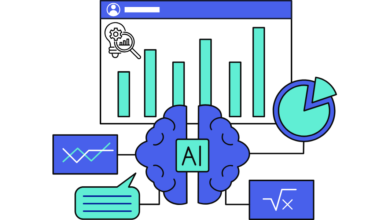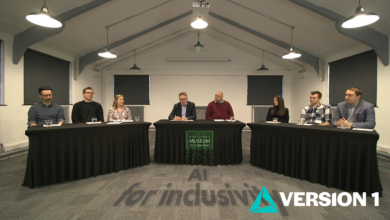
With the current hype around the limitless possibilities of AI alongside high stakes in the healthcare sector such as elongating human lifespans and finding cures for debilitating disease, the biotech industry may be seeing a resurgence of financial interest after falling levels of early investment in biotech startups over the last couple of years. Perhaps this is not so surprising given that healthcare is currently one of the key industries driving AI’s phenomenal growth.
Interface Biosciences, an American enterprise specializing in anti-inflammatory drug development, certainly seems to indicate a potential upward trajectory for investment in biotech, having just secured $3 million in its latest and oversubscribed series-A seed funding round. Thanks to the effective integration of AI into its drug discovery program, this company has managed to successfully weather the fluctuations of the biotech industry so far, after starting out in the Covid-19-inspired boom of 2020, only to see investment levels fall by 29% between September 2021 and May 2022.
Interface Bio uses a full-stack pipeline to create its own large, high-quality dataset which is then analysed using machine learning (ML) to find new treatment possibilities for inflammatory disease. According to research by McKinsey & Co, while there are approximately 270 AI-driven drug discovery enterprises, not many of them have their own pipeline, with only 15% having this asset at the stage of preclinical development.
This puts Interface Bio in the frontline of biotech enterprises using AI and indicates that the integration of cutting-edge AI technology into the drug development process is becoming a key selling point for investors. Indeed, this market can be hostile to startups as a result of over half the funding raised being poured into the top 10 companies, so the effective use of AI and a clear vision of what can be achieved with the technology may now be central for investment strategy.
The other key to success in biotech, of course, is finding a market with lucrative potential and scope for growth. In this area too, Interface-Bio has found a comfortable niche in the market with its focus on inflammatory disease, which represents a significant global market simply because it is so widespread, with as many as 1 in 5 people in the Western world suffering from some form of it.
The term ‘inflammatory disease’ refers to a variety of long-term health conditions that have in common the permanent or recurring inflammation of the body’s tissue. The most widely known inflammatory conditions are asthma, eczema, IBS, rheumatoid arthritis, and Alzheimer’s disease. Asthma and eczema, in particular, have increased in severity and number over the last few decades as a result of worsening pollution and the increased use of chemicals in food and cleaning products.
For this reason, inflammatory disease will be an increasingly lucrative and stable market as there will be a predictable demand for anti-inflammatory drugs, with growing numbers of sufferers requiring regular medication. This is confirmed by a recent report by Global Market Insights, which found that the anti-inflammatory drugs market accounted for $104 billion in 2022, and is expected to show a steady increase of 8.4% to $233.6 billion by 2032 as a result of the disease’s growing prevalence and the aging population.
Interface-Bio’s AI-enabled treatment for inflammatory diseases
At the heart of Interface Bio’s innovative success is the integration of AI with metabolomics (the study of small molecules). Co-founders Hannah C. Wastyk and Will van Treuren share an interest in small molecules, particularly commensal microbes which they consider to be ‘the world’s most powerful chemists, thanks to the billions of years spent co-evolving with mammals’.
Their use of AI and ML to create and analyse a large, high-quality dataset enables a deeper analysis of inflammatory disease including the identification of causal links between genes or lifestyle, and the disease. This will set apart the company’s new drug from existing treatments, which typically do not address the disease’s complex pathology. Furthermore, the use of AI for data analysis greatly increases the efficiency of the otherwise costly and wasteful traditional drug discovery process which, according to the medical research journal JAMA, takes up 30% of all molecular entity costs, with only 0.1% of candidate molecules passing from screening to phase 1 of clinical testing.

Interface Bio’s primary therapeutic drug is a 44-amino peptide called RC13, derived from Ruminoocccus gnavus, a healthy bacterium found in the human gut. RC13 has multiple benefits for the human body, including the promotion of wound healing, reduction of inflammation, and antibiotic defense against harmful pathogens, giving it a variety of properties essential to treating a range of inflammatory diseases.
In terms of its toleration, results are hopeful with the initial data indicating the peptide’s stability and non-toxic nature. Further testing will confirm this initial potential, and in-vivo studies (i.e. carried out on living organisms) for the drug are expected to begin in January 2024, with a patent filing to follow shortly afterward in the latter half of the year.
There is still a long way to go, however, before this drug will become commercially available, with several years of further clinical testing, including human trials to follow, as well as the process of market approval. Nevertheless, Interface-Bio’s use of AI for the initial identification of anti-inflammatory microbes has certainly sped up the overall development process, which typically takes 12+ years.
The future of biotech and AI in healthcare: what investors are dreaming of
The AI-driven biotech industry holds appeal to investors not only for its promising financial returns but also for its key role in shaping the future of healthcare and ecology. A couple of Interface Bio’s newer sponsors, SeedFolio and LongeVC, have more than money on their agenda when it comes to investing. SeedFolio is driven by the objectives of conquering diseases and cleaning up the planet with innovative technology.
These goals represent two major applications of biotech, as well as being prevalent global concerns. Interface Bio holds appeal for investors on both these fronts with its AI-enabled use of microbes, which are not only a rich, relatively untapped source of therapeutics, but are also naturally occurring organisms that wreak less environmental destruction than chemically derived synthetic drugs.
LongeVC meanwhile, is on a mission to create an ageless future by bringing groundbreaking biotech to the market to expand the horizons of human health and longevity. Currently, it is pursuing AI’s potential in the healthcare industry by improving early cancer diagnostics, using SaaS to utilise medical data more efficiently, leveraging epigenetic discovery, and using AI and ML for therapeutic innovation.
“We’ve backed Interface Biosciences due to their pioneering and innovative use of machine learning techniques to unearth new medications and therapies,” says Sergey Jakimov, LongeVC’s co-founder and managing partner. “By building a unique end-to-end drug discovery platform geared towards identifying immunomodulatory and longevity-promoting commensal natural products, Interface Bio unlocks a suite of potentially promising new treatments that can be developed as traditional pharmaceuticals.”



